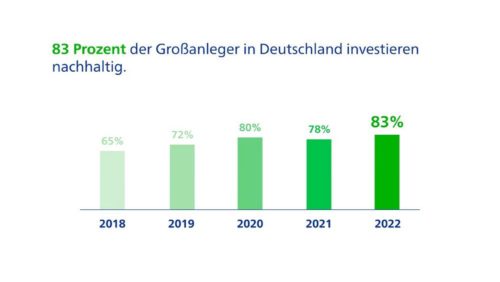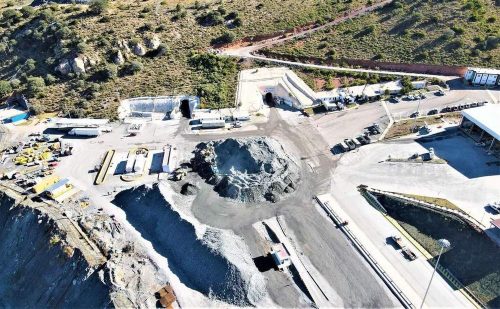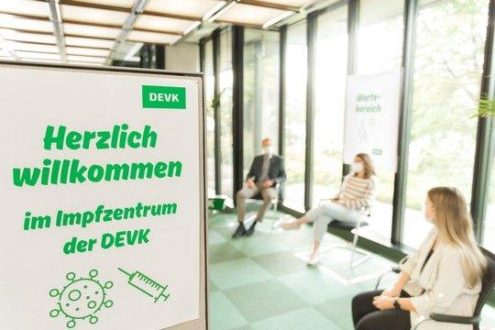Osisko Metals provides initial findings on Pine Point hydrogeological program
Highlights:
- New hydrogeological testing at Pine Point indicates a significant and positive change to the Company’s understanding of ground water flow conditions with potential to significantly reduce costs related to future dewatering.
- The underground water flow appears to be preferentially controlled by faults and/or fracture zones with little influence related to formational aquifers.
- Updated PEA in Q1 2022 will incorporate new 3D hydrogeological model and should significantly lower sustaining CAPEX and OPEX estimates for life-of-mine water management.
Profile Tracer Tests (“PTT”) have been completed on 10 water well holes (wide-diameter diamond drill holes) from the 18 holes completed this winter. Only two of the 18 holes produced water to surface and these are located in the northern-most area of the property, outside the mineralized trends. PTT tests were focused in the south-western portion of the camp, where water infiltration is potentially at highest risk. Profile Tracer Testing consists of mixing a tracer in the borehole without inducing any stress, followed by monitoring the tracer dilution within the same hole. This allows for accurate location of water-bearing discontinuities/units and behavior characterization.
Preliminary PTT results indicate that the groundwater flow is preferentially controlled by discrete discontinuities (i.e., faults and or fracture zones) with little influence from any formational aquifer, including the dolomitized Sulfur Point Formation that hosts most of the zinc and lead Mineral Resources. This represents a significant shift from previous interpretations of underground water flow modelling at Pine Point, which was almost exclusively based on formational aquifer flow within the Sulfur Point Formation and/or the underlying Pine Point Formation.
Robert Wares, Chairman & CEO, commented: “These preliminary results represent a paradigm shift concerning underground water infiltration at Pine Point. Indeed, previous interpretations assumed that formational aquifers controlled the majority of such infiltration. These preliminary PTT results suggest discrete fault controls and we anticipate these will result in a more efficient dewatering plan. Cominco operated successfully at Pine Point for 24 years and demonstrated that mine dewatering was manageable in the main part of the camp, and we firmly believe, especially in light of these preliminary results, that this will also be the case in the south-western portion of the camp which includes the high-grade West Zone deposits.”
“We eagerly await further results from the hydrogeological program later this year in order to update our previously-filed 2020 Preliminary Economic Assessment (“2020 PEA”) in Q1 2022. The 2020 PEA utilized very conservative assumptions and hence expensive dewatering estimates and, based on test data collected from the 2021 hydrogeological program, we anticipate significantly lower sustaining CAPEX and OPEX costs for water management in the forthcoming PEA update.”
Hydrogeological Program Details
Hydrogeological measurements will be incorporated into a 3D hydrogeological model that is being integrated with a recently completed site-wide 3D geological model. It is expected that this 3D modelling methodology and strategic mine planning of the various clusters of deposits will enable a significant proportion of the Mineral Resources included in the 2020 PEA to be mined more cost effectively. Included in the model will be all available structural data from drilling and interpreted lineaments, along with karstic features. Ongoing work will enable the Company to better measure and analyze underground water flow and compare these results to the historical data for benchmarking purposes
Since the 3D geological model was not completed prior to the 2020 PEA, a simplified hydrogeological analysis method was used based on infiltration along a conceptual aquifer with infinite extents, uniform permeability, porosity and thickness. Based on these preliminary results, the Company now considers that the previous Pine Point dewatering cost estimates were overly conservative.
Jeff Hussey, President & COO, commented: “During the Cominco Ltd. era, mine planning and dewatering strategies evolved as resources were outlined. We have the benefit of being able to leverage a well-established life of mine plan. Ongoing studies and the 3D hydrogeological modelling will allow for better sequencing of the proposed life of mine plan and potentially achieve even lower pumping rates than historically. With this model, we will able to quickly integrate new discoveries into our dewatering strategy.”
The scope of work includes the estimation of water inflow rates into the proposed open pit and shallow underground mines that were included in the 2020 PEA report. The objective is to use these estimates to optimize the integration of the dewatering strategy into the life-of-mine (“LOM”) plan. This will include strategic mine planning logistics and the new dewatering cost estimates.
The 2020 PEA modelled flow along a conceptual aquifer that necessitated the consideration of dewatering all open pits individually, even if field observations in certain zones, such as the East Mill Zone in the main camp, highlighted a lack of water in historical pits. Furthermore, the previous model assumed infinite extents and relatively uniform permeability, porosity and thickness within the aquifer. The uniform thickness constraint of the conceptual aquifer is not supported by the recently completed 3D geological model that clearly illustrates that thickness varies both along mineralized trend and orthogonal to the trends hosting zinc-lead mineralization.
Previous dewatering cost estimates associated to a conceptual uniform aquifer are considered to be much higher when compared to an aquifer with variable thickness and discrete structural controls. The mine planning of deposit clusters will select deeper pits to be mined first within a cluster, and in doing so it is likely that neighboring pits will have substantially reduced dewatering requirements. This will be a main focus of the new mining strategy combined with the mining of pits in an accelerated fashion to reduce the dewatering period and therefore the volume of water to pump.
Hydro-Ressources Inc. has been retained by the Company to model hydrogeology at Pine Point who are a well-known international consulting firm that specializes in mine dewatering and hydrogeological technology development. The firm has unique expertise in operational dewatering in both open pit and underground mines globally, including experience in similar carbonate-hosted base metal mines. Since its founding in 2011, Hydro-Ressources has developed and improved methodologies to optimize and manage mine dewatering and characterize hydrogeological features in fractured rock environments.
Hydro-Ressources Inc. will use the Company’s 3D site-wide geological model to continue hydrogeological testing and investigations to better characterize water flow at Pine Point. It will define and model the various rock units in each mining area that will include:
- The heterogeneity of flow patterns,
- Water quality assessment,
- Assessment of water inflow into each potential/proposed shallow open pit and underground mine in the LOM plan.
The testing methodologies include state-of-the-art measurement systems, such as Profile Tracer Tests, slug tests, injection tests, velocity flow profiles, water sampling and chemistry profiles, and pump test analyses, among others.
Hydrogeological modelling enhancements will be an iterative process going forward. The results will be used for Environmental Assessment purposes and the Q1 2022 PEA update and the eventual Feasibility Study.
Osisko Development Corporation is also supporting the project as the Company’s internal design engineers that will integrate the hydrogeological results into the new LOM plan for the updated PEA in Q1 2022.
Qualified Person
Mr. Michael Verreault P.Eng. MSc, will be acting as the Qualified Person for Osisko Metals regarding hydrogeological work. He is a Professional Geological Engineer with a Master’s degree in Hydrogeology, and he is responsible for the technical data reported in this news release.
Mr. Robin Adair is the Qualified Person and the Vice President Exploration for Osisko Metals Incorporated. He is a Professional Geologist registered in the Northwest Territories.
About Osisko Metals
Osisko Metals Incorporated is a Canadian exploration and development company creating value in the base metal space. The Company controls one of Canada’s premier past-producing zinc mining camps, the Pine Point Project, located in the Northwest Territories for which the 2020 PEA has indicated an after-tax NPV of $500M and an IRR of 29.6%. The Pine Point Project PEA is based on current Mineral Resource Estimates that are amenable to open pit and shallow underground mining and consist of 12.9Mt grading 6.29% ZnEq of Indicated Mineral Resources and 37.6Mt grading 6.80% ZnEq of Inferred Mineral Resources. Please refer to the technical report entitled “Preliminary Economic Assessment, Pine Point Project, Hay River, North West Territories, Canada” dated July 30, which has been filed on SEDAR. The Pine Point Project is located on the south shore of Great Slave Lake in the Northwest Territories, near infrastructure, paved highway access, and has an electrical substation as well as 100 kilometres of viable haulage roads already in place.
The current Mineral Resources mentioned in this press release conform to NI43-101 standards and were prepared by independent qualified persons, as defined by NI43-101 guidelines. The abovementioned Mineral Resources are not Mineral Reserves as they do not have demonstrated economic viability. The quantity and grade of the reported Inferred Mineral Resources are conceptual in nature and are estimated based on limited geological evidence and sampling. Geological evidence is sufficient to imply but not verify geological grade and/or quality of continuity. Zinc equivalency percentages are calculated using metal prices, forecasted metal recoveries, concentrate grades, transport costs, smelter payable metals and charges (see respective technical reports for details).
Cautionary Statement on Forward-Looking Information
This news release contains "forward-looking information" within the meaning of applicable Canadian securities legislation based on expectations, estimates and projections as at the date of this news release. Any statement that involves predictions, expectations, interpretations, beliefs, plans, projections, objectives, assumptions, future events or performance are not statements of historical fact and constitute forward-looking information. This news release may contain forward-looking information pertaining to the Pine Point Project, including, among other things, the results of the PEA and the IRR, NPV and estimated costs, production, production rate and mine life; the expectation that the Pine Point Project will be an robust operation and profitable at a variety of prices and assumptions; the expected high quality of the Pine Point concentrates; the potential impact of the Pine Point Project in the Northwest Territories, including but not limited to the potential generation of tax revenue and contribution of jobs; and the Pine Point Project having the potential for mineral resource expansion and new discoveries. Forward-looking information is not a guarantee of future performance and is based upon a number of estimates and assumptions of management, in light of management’s experience and perception of trends, current conditions and expected developments, as well as other factors that management believes to be relevant and reasonable in the circumstances, including, without limitation, assumptions about: favourable equity and debt capital markets; the ability to raise additional capital on reasonable terms to advance the development of its projects and pursue planned exploration; future prices of zinc and lead; the timing and results of exploration and drilling programs; the accuracy of mineral resource estimates; production costs; operating conditions being favourable; political and regulatory stability; the receipt of governmental and third party approvals; licences and permits being received on favourable terms; sustained labour stability; stability in financial and capital markets; availability of equipment; and positive relations with local groups. Forward-looking information involves risks, uncertainties and other factors that could cause actual events, results, performance, prospects and opportunities to differ materially from those expressed or implied by such forward-looking information. Factors that could cause actual results to differ materially from such forward-looking information are set out in the Company’s public documents filed at www.sedar.com. Although the Company believes that the assumptions and factors used in preparing the forward-looking information in this news release are reasonable, undue reliance should not be placed on such information, which only applies as of the date of this news release, and no assurance can be given that such events will occur in the disclosed time frames or at all. The Company disclaims any intention or obligation to update or revise any forward-looking information, whether as a result of new information, future events or otherwise, other than as required by law.
Neither the TSX Venture Exchange nor its Regulation Services Provider (as that term is defined in the policies of the TSXV) accepts responsibility for the adequacy or accuracy of this news release.
Swiss Resource Capital AG
Poststrasse 1
CH9100 Herisau
Telefon: +41 (71) 354-8501
Telefax: +41 (71) 560-4271
http://www.resource-capital.ch
CEO
Telefon: +41 (71) 3548501
E-Mail: js@resource-capital.ch
![]()



